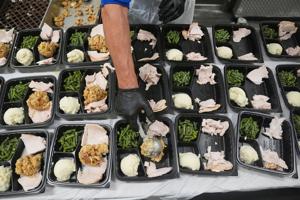Two federal judges ruled on November 1, 2023, that the Trump administration must utilize emergency reserve funds to continue financing the Supplemental Nutrition Assistance Program (SNAP) during the ongoing government shutdown. The decisions, rendered by judges in Massachusetts and Rhode Island, have created uncertainty regarding the full or partial funding of the program for November, potentially delaying payments for millions of beneficiaries who typically receive assistance at the beginning of the month.
The U.S. Department of Agriculture (USDA) had previously announced plans to halt SNAP payments starting November 1, stating it could no longer sustain funding due to the shutdown. SNAP, which serves approximately 41 million people—about one in eight Americans—represents a significant aspect of the nation’s social safety net, costing around $8 billion monthly. In light of the judges’ rulings, U.S. Senator Amy Klobuchar, a Minnesota Democrat and the ranking member of the Senate Agriculture Committee, criticized the administration, asserting that it is legally obligated to continue providing assistance to those in need.
Democratic state officials from 25 states, along with the District of Columbia, challenged the USDA’s plan to pause SNAP, arguing that the administration has a legal duty to keep the program operational. The administration contended that it could not utilize approximately $5 billion in contingency funds for SNAP, despite prior indications from the USDA that these funds would be tapped to maintain the program. The Democratic officials insisted that not only could these funds be used, but they must be employed to prevent disruptions in service.
In a decisive ruling from U.S. District Judge John J. McConnell in Providence, Rhode Island, the court mandated the administration to allocate at least some of the contingency funds to SNAP. McConnell also requested an update on the progress by Monday. He emphasized that all previous work requirement waivers must remain in effect, countering the USDA’s termination of existing waivers for certain vulnerable populations, including older adults and veterans.
Across the state line in Boston, U.S. District Judge Indira Talwani issued a written opinion asserting that the USDA must continue funding SNAP, describing the suspension as “unlawful.” She ordered the federal government to clarify whether it would use the emergency reserve funds to provide either reduced benefits or full funding for November. Talwani stated, “Defendants’ suspension of SNAP payments was based on the erroneous conclusion that the Contingency Funds could not be used to ensure continuation of SNAP payments.”
Despite the judges’ rulings, many beneficiaries will still experience delays in receiving their benefits due to the time required to process payments. The administration has not disclosed whether it plans to appeal the decisions. Food banks and state officials have been preparing for a significant impact on low-income households if SNAP funding were to be halted, as many families would face difficult choices between purchasing groceries and paying other bills.
Advocates for SNAP recipients expressed cautious relief following the rulings. Diane Yentel, president and CEO of the National Council of Nonprofits, noted that the decisions would prevent severe hardships for countless families and organizations that rely on SNAP. “Thousands of nonprofit food banks, pantries, and other organizations across the country can avoid the impossible burden that would have resulted if SNAP benefits had been halted,” Yentel stated.
In West Virginia, Cynthia Kirkhart, CEO of Facing Hunger Food Bank, highlighted the ongoing challenges her organization faces. Despite the court’s intervention, she expressed concerns about the uncertainty surrounding benefits, noting, “What we know, unless the administration is magical, is nothing is going to happen tomorrow.”
For many families, the prospect of reduced benefits raises significant anxiety. Kristle Johnson, a 32-year-old nursing student and mother of three in Florida, voiced her worries about the potential impact on her family’s budget. “My $994 a month benefit doesn’t buy a full month’s groceries,” Johnson remarked, emphasizing the strain low-income families face.
At a press conference earlier on the same day, Agriculture Secretary Brooke Rollins criticized Democrats for not resolving the political stalemate that has led to the shutdown. She characterized their actions as a “disgusting dereliction of duty,” blaming them for not allowing a funding extension for SNAP that had been proposed in Congress.
The court’s ruling underscores the ongoing political tensions surrounding SNAP funding. Skye Perryman, president and CEO of Democracy Forward, commented on the significance of the Rhode Island decision, stating, “The court’s ruling protects millions of families, seniors, and veterans from being used as leverage in a political fight and upholds the principle that no one in America should go hungry.”
As the situation develops, the future of SNAP funding remains uncertain, and millions of Americans are left waiting for clarity on their vital assistance.







